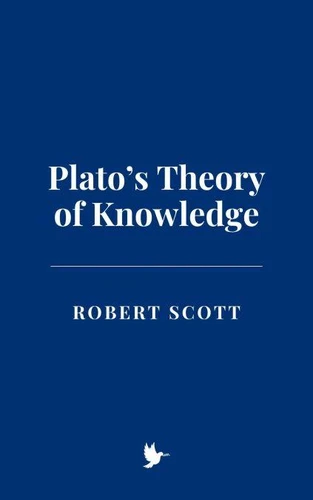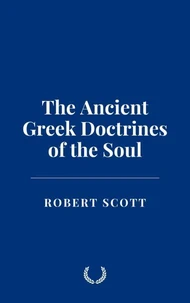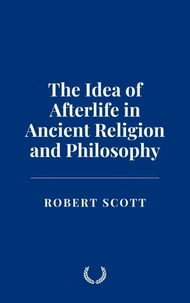Plato’s Theory of Knowledge
Par :Formats :
Disponible dans votre compte client Decitre ou Furet du Nord dès validation de votre commande. Le format ePub est :
- Compatible avec une lecture sur My Vivlio (smartphone, tablette, ordinateur)
- Compatible avec une lecture sur liseuses Vivlio
- Pour les liseuses autres que Vivlio, vous devez utiliser le logiciel Adobe Digital Edition. Non compatible avec la lecture sur les liseuses Kindle, Remarkable et Sony
 , qui est-ce ?
, qui est-ce ?Notre partenaire de plateforme de lecture numérique où vous retrouverez l'ensemble de vos ebooks gratuitement
Pour en savoir plus sur nos ebooks, consultez notre aide en ligne ici
- FormatePub
- ISBN8230326298
- EAN9798230326298
- Date de parution15/01/2025
- Protection num.pas de protection
- Infos supplémentairesepub
- ÉditeurIndependently Published
Résumé
The philosophical journey that Plato undertook was not merely an abstract quest for understanding but a profound and systematic attempt to answer one of humanity's most enduring questions: What does it mean to know something? In the ancient world of 5th and 4th century BCE Athens, knowledge was not a trivial matter. Greece was undergoing profound political, cultural, and intellectual transformations.
The Peloponnesian War (431-404 BCE) had shaken the Athenian polis, eroding confidence in traditional values and democratic institutions. The execution of Socrates in 399 BCE, Plato's mentor, left a deep wound in the soul of his pupil and reinforced the belief that ignorance and moral corruption could lead to catastrophic outcomes. For Plato, the inability of the Athenian populace to distinguish truth from mere persuasion represented the tragic consequences of a society that had lost its grasp on true knowledge.
It is from this historical crucible that Plato's theory of knowledge emerged. Plato's philosophical contributions are inseparable from the intellectual legacy of Socrates, whose method of dialectic or "elenchus" formed the basis of Plato's early inquiries into epistemology. Socrates never claimed to possess knowledge himself but was relentless in exposing ignorance through probing questions. In dialogues such as Apology, Euthyphro, and Crito, Socrates repeatedly demonstrated that many who claimed to "know" were unable to justify their beliefs when subjected to rational examination.
This early epistemological skepticism laid the groundwork for Plato's exploration of the nature of knowledge itself. However, whereas Socrates appeared content to uncover ignorance without proposing an overarching system, Plato sought to construct a robust metaphysical and epistemological framework that could explain not only what knowledge is but also how humans can possess it. Central to Plato's theory of knowledge is the Theory of Forms, which he elaborates across several key dialogues, including Phaedo, The Republic, and Timaeus.
The Forms, or "eide" (singular "eidos"), are perfect, immutable, and eternal entities that exist in a separate, intelligible realm beyond the material world. Plato postulated that true knowledge (episteme) is knowledge of these Forms, as opposed to mere opinion (doxa), which concerns the fluctuating, imperfect world of sensory experience.
The Peloponnesian War (431-404 BCE) had shaken the Athenian polis, eroding confidence in traditional values and democratic institutions. The execution of Socrates in 399 BCE, Plato's mentor, left a deep wound in the soul of his pupil and reinforced the belief that ignorance and moral corruption could lead to catastrophic outcomes. For Plato, the inability of the Athenian populace to distinguish truth from mere persuasion represented the tragic consequences of a society that had lost its grasp on true knowledge.
It is from this historical crucible that Plato's theory of knowledge emerged. Plato's philosophical contributions are inseparable from the intellectual legacy of Socrates, whose method of dialectic or "elenchus" formed the basis of Plato's early inquiries into epistemology. Socrates never claimed to possess knowledge himself but was relentless in exposing ignorance through probing questions. In dialogues such as Apology, Euthyphro, and Crito, Socrates repeatedly demonstrated that many who claimed to "know" were unable to justify their beliefs when subjected to rational examination.
This early epistemological skepticism laid the groundwork for Plato's exploration of the nature of knowledge itself. However, whereas Socrates appeared content to uncover ignorance without proposing an overarching system, Plato sought to construct a robust metaphysical and epistemological framework that could explain not only what knowledge is but also how humans can possess it. Central to Plato's theory of knowledge is the Theory of Forms, which he elaborates across several key dialogues, including Phaedo, The Republic, and Timaeus.
The Forms, or "eide" (singular "eidos"), are perfect, immutable, and eternal entities that exist in a separate, intelligible realm beyond the material world. Plato postulated that true knowledge (episteme) is knowledge of these Forms, as opposed to mere opinion (doxa), which concerns the fluctuating, imperfect world of sensory experience.
The philosophical journey that Plato undertook was not merely an abstract quest for understanding but a profound and systematic attempt to answer one of humanity's most enduring questions: What does it mean to know something? In the ancient world of 5th and 4th century BCE Athens, knowledge was not a trivial matter. Greece was undergoing profound political, cultural, and intellectual transformations.
The Peloponnesian War (431-404 BCE) had shaken the Athenian polis, eroding confidence in traditional values and democratic institutions. The execution of Socrates in 399 BCE, Plato's mentor, left a deep wound in the soul of his pupil and reinforced the belief that ignorance and moral corruption could lead to catastrophic outcomes. For Plato, the inability of the Athenian populace to distinguish truth from mere persuasion represented the tragic consequences of a society that had lost its grasp on true knowledge.
It is from this historical crucible that Plato's theory of knowledge emerged. Plato's philosophical contributions are inseparable from the intellectual legacy of Socrates, whose method of dialectic or "elenchus" formed the basis of Plato's early inquiries into epistemology. Socrates never claimed to possess knowledge himself but was relentless in exposing ignorance through probing questions. In dialogues such as Apology, Euthyphro, and Crito, Socrates repeatedly demonstrated that many who claimed to "know" were unable to justify their beliefs when subjected to rational examination.
This early epistemological skepticism laid the groundwork for Plato's exploration of the nature of knowledge itself. However, whereas Socrates appeared content to uncover ignorance without proposing an overarching system, Plato sought to construct a robust metaphysical and epistemological framework that could explain not only what knowledge is but also how humans can possess it. Central to Plato's theory of knowledge is the Theory of Forms, which he elaborates across several key dialogues, including Phaedo, The Republic, and Timaeus.
The Forms, or "eide" (singular "eidos"), are perfect, immutable, and eternal entities that exist in a separate, intelligible realm beyond the material world. Plato postulated that true knowledge (episteme) is knowledge of these Forms, as opposed to mere opinion (doxa), which concerns the fluctuating, imperfect world of sensory experience.
The Peloponnesian War (431-404 BCE) had shaken the Athenian polis, eroding confidence in traditional values and democratic institutions. The execution of Socrates in 399 BCE, Plato's mentor, left a deep wound in the soul of his pupil and reinforced the belief that ignorance and moral corruption could lead to catastrophic outcomes. For Plato, the inability of the Athenian populace to distinguish truth from mere persuasion represented the tragic consequences of a society that had lost its grasp on true knowledge.
It is from this historical crucible that Plato's theory of knowledge emerged. Plato's philosophical contributions are inseparable from the intellectual legacy of Socrates, whose method of dialectic or "elenchus" formed the basis of Plato's early inquiries into epistemology. Socrates never claimed to possess knowledge himself but was relentless in exposing ignorance through probing questions. In dialogues such as Apology, Euthyphro, and Crito, Socrates repeatedly demonstrated that many who claimed to "know" were unable to justify their beliefs when subjected to rational examination.
This early epistemological skepticism laid the groundwork for Plato's exploration of the nature of knowledge itself. However, whereas Socrates appeared content to uncover ignorance without proposing an overarching system, Plato sought to construct a robust metaphysical and epistemological framework that could explain not only what knowledge is but also how humans can possess it. Central to Plato's theory of knowledge is the Theory of Forms, which he elaborates across several key dialogues, including Phaedo, The Republic, and Timaeus.
The Forms, or "eide" (singular "eidos"), are perfect, immutable, and eternal entities that exist in a separate, intelligible realm beyond the material world. Plato postulated that true knowledge (episteme) is knowledge of these Forms, as opposed to mere opinion (doxa), which concerns the fluctuating, imperfect world of sensory experience.























